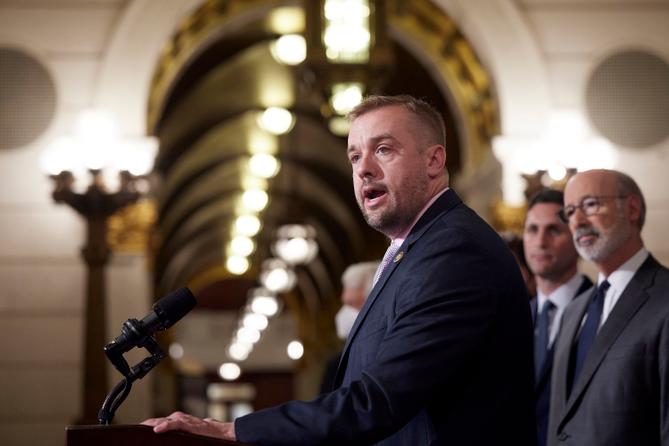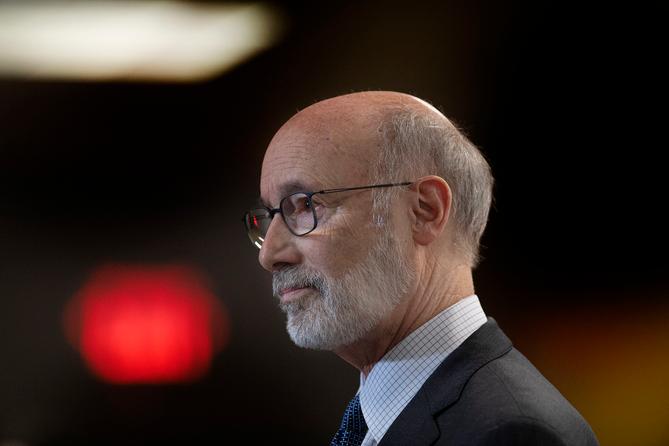Spotlight PA is an independent, nonpartisan newsroom powered by The Philadelphia Inquirer in partnership with PennLive/The Patriot-News, TribLIVE/Pittsburgh Tribune-Review, and WITF Public Media. Sign up for our free newsletters.
HARRISBURG — Gov. Tom Wolf has signed a $2 billion tax credit package for the hydrogen production, milk processing, and biomedical research industries into law, capping months of quiet negotiations between the Democrat and top Republicans in the General Assembly.
Ninety cents out of each dollar offered will be used to encourage the use of natural gas, including $1 billion in tax incentives to attract a new “hydrogen hub” to Pennsylvania.
The package will provide $50 million a year in tax breaks to a company that agrees to produce hydrogen for 20 years and increase an existing methane tax credit by $30 million to $56.5 million annually. The latter credit, passed in 2020 and set to expire in 2050, was designed to encourage the use of methane to manufacture other products, such as fertilizer or gasoline.
The legislation also includes $15 million annually over eight years for a milk processing project, $10 million annually over 5 years for biomedical research, and $10 million annually over 5 years for semiconductor production.
The package was publicly introduced as an amendment to a bill just after 3 p.m. on Oct. 26. Less than six hours later, both the state House and Senate passed the legislation. There was little public debate and no public hearings.
Despite its hasty passage, top Republican lawmakers said the bill’s language was negotiated for months, and that some of the proposals came out of the state’s spring budget talks.
“While it took a while to come together, I’m glad that it finally did,” state House Speaker Bryan Cutler (R., Lancaster) said after the deal cleared the chamber in a late-night vote.
Spotlight PA first publicly reported details of the deal on Oct. 24, kicking off a furious wave of lobbying aimed at Wolf and the legislature in the days before the bill’s passage.
Environmental groups roundly criticized the package as a waste of money that could instead be spent on “proven and inexpensive clean energy technologies” like solar and wind production.
“This is slapdash industrial policy at its worst that will perpetuate Pennsylvania’s addiction to fossil fuels,” Patrick McDonnell, president of the environmental group PennFuture and a former cabinet secretary under Wolf, said in a statement.
Some conservative groups, such as the free-market Commonwealth Foundation, also came out against the proposal.
“We support reducing tax rates for all businesses and oppose handouts to the politically selected,” foundation Vice President Stephen Bloom said.
But the proposal also had the backing of the politically potent building trade unions. In an Oct. 25 letter, Robert Bair, president of the Pennsylvania State Building & Construction Trades Council, urged lawmakers to advance the proposal without any changes.
The package “has been carefully and thoughtfully crafted to support several major construction projects around the state,” the letter said without providing specifics.
The final language requires a company to pay construction workers on any project that qualifies for a tax credit the prevailing wage. However, no similar protections exist within the law for workers who receive permanent jobs at the completed facilities.
The council did not reply to a request for comment.
In the end, the package’s supporters won. The proposal passed the state Senate 41-8, and then the state House sent it to Wolf’s desk in a 139-59 vote. Lawmakers in both major parties were among the bill’s supporters and opponents.
The latter argued the bill kowtowed to corporate interests, and that the legislature rushed its passage.
Among the lawmakers who voted “no” was GOP gubernatorial nominee, state Sen. Doug Mastriano (R., Franklin). Neither his state Senate office nor his campaign responded to requests for comment.
State Rep. Austin Davis (D., Allegheny), a candidate for lieutenant governor who will appear next to Democratic nominee Josh Shapiro on the Nov. 8 ballot, voted in favor of the package.
During the floor debate, State Rep. Eric Nelson (R., Westmoreland) said lawmakers who voted against the deal represent “two extreme sides” that oppose economic opportunities for Pennsylvania.
“If we don’t engage, we will lose out,” Nelson said. “It’s tough to support a tax credit, but we need to.”

But David Passmore, a retired Penn State professor of applied economics, told Spotlight PA that economic research has found companies often know exactly where they want to locate before they seek a single tax incentive.
He also noted that having a company physically in Pennsylvania, rather than a neighboring state, may not be as important economically as some lawmakers claim.
He pointed to Shell’s near-complete cracker plant in Beaver County which will turn natural gas into plastics. Former Gov. Tom Corbett, a Republican, and the General Assembly provided the company with $1.65 billion in tax incentives to locate in Pennsylvania.
But even if the plant were built just across the border in West Virginia, Pennsylvania workers would likely still have been hired, Passmore argued. Also, he added, Pennsylvania drilled gas would likely be bought to feed its furnace.
“Whenever I see subsidies and credits come up, they’re talking about opportunity costs,” he said, “and that funding is going to have to come from someplace.”
Progressive lawmakers who voted against the bill argued it would disrupt the state’s climate goals by encouraging natural gas drilling.
“We have a huge opportunity to transform our energy system and create millions of good paying jobs and put our state on a sustainable pathway,” state Sen. Nikil Saval (D., Philadelphia) said. “This legislation takes us in an opposite direction.”
Environmentalists said the bill should have, at minimum, expanded or created programs to encourage renewable energy, such as wind and solar.
But Cutler argued those industries use rare earth materials that aren’t as common in Pennsylvania and have to be imported from outside the state, if not the country.
The package, Cutler added, “is about focusing on Pennsylvania’s strengths and making sure that those opportunities are there and not supporting the economies of countries that may not always have our best interests … in mind.”
The proposed hydrogen credit bolsters funding included in the 2021 federal infrastructure bill, which allocated $7 billion in federal aid to develop at least six such hubs around the country.
Interested companies must send the federal government an initial sketch of their plan by Nov. 7 and submit a full application by April 2023.
In a letter informing lawmakers he would sign the bill, Wolf said that “partners in Pennsylvania are currently preparing applications…to pursue this opportunity.”
One source close to negotiations, who asked for anonymity to discuss private discussions, said the intended recipient for the hydrogen hub credit is Pittsburgh-based U.S. Steel.
The company announced plans in August to pursue a hydrogen hub in the “Ohio, West Virginia, Pennsylvania region” in conjunction with Shell and a third company.
The company still has four steel-making facilities in Pennsylvania — including one in Clairton that has been fined for pollution in recent years — and experts have noted that one of hydrogen’s best uses could be to decarbonize heavy industries like steel.
In his letter, Wolf pointed to a requirement that hydrogen credit recipients follow federal guidance for carbon capture to ensure that the hydrogen produced from fracked natural gas would be carbon neutral and not contribute to the state’s 200 million-plus tons of annual greenhouse gas emissions.
“But for these strong environmentally protective requirements, I would not be signing this legislation,” Wolf said in a statement.
Environmentalists noted that those federal standards, set by the Department of Energy, could be loosened by the next administration.
Given Wolf’s focus on reducing carbon pollution through an initiative to cap emissions from power plants, “it is disappointing to see more fossil fuel subsidies as part of his legacy as he leaves office,” Katie Blume, political and legislative director of Conservation Voters of Pennsylvania, told Spotlight PA.
Other intended recipients of the credit expansion, the source said, include Houston-based Nacero, which last year announced plans to build a $6 billion plant converting natural gas to gasoline in northeastern Pennsylvania. The company has yet to apply for environmental permits, according to the state Department of Environmental Protection.
The final intended recipient is Chicago-based Fairlife, a dairy company and subsidiary of Coca-Cola that has yet to announce any expansion plans. But the source said it is hoped that a new processing plant will use Pennsylvania-produced milk.
None of the companies replied to requests for comment. To qualify for the credits, all would have to hit specific investment and job requirements.
The credits are transferable, meaning that if a company does not have a tax liability, it can sell the credits to another company. The state’s controversial film tax credit is similarly constructed, and allows companies unrelated to movie and TV production to reduce their tax bills.
WHILE YOU’RE HERE… If you learned something from this story, pay it forward and become a member of Spotlight PA so someone else can in the future at spotlightpa.org/donate. Spotlight PA is funded by foundations and readers like you who are committed to accountability journalism that gets results.

